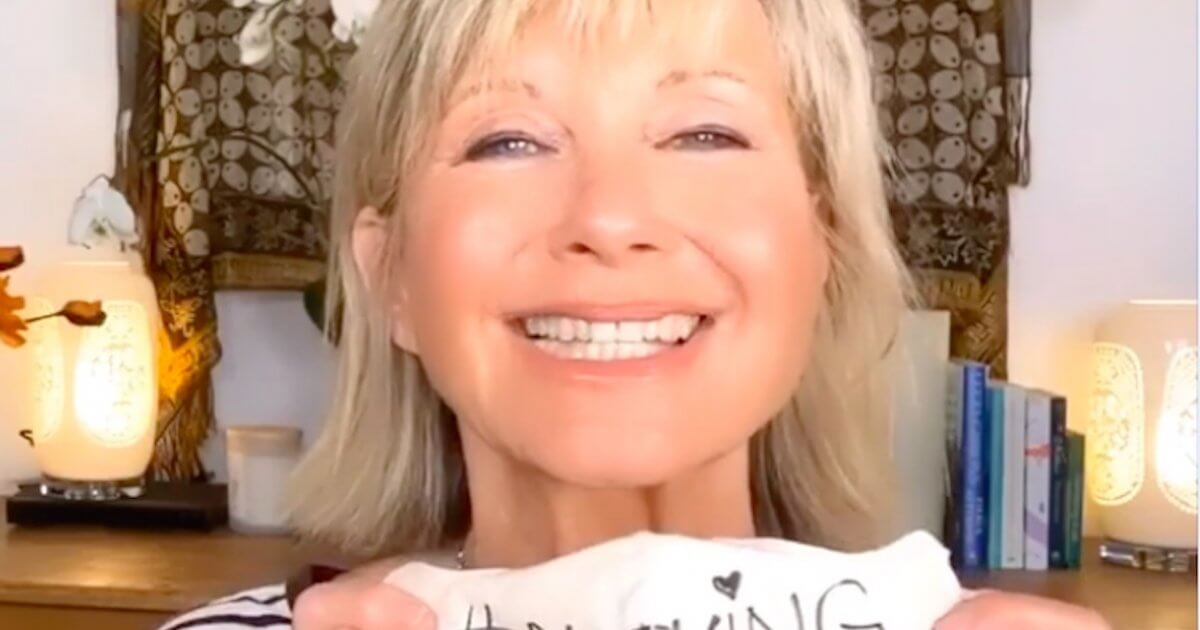Even while living with metastatic breast cancer, Olivia Newton-John makes a point of looking on the bright side. And during quarantine, she’s continued to focus on good causes, while protecting her health. Now, she’s “Masking For a Friend” on behalf of the Pandemic Action Network, a global
RELATED: Coronavirus Guide For Cancer Patients
Read MoreThe organization is committed to promoting policies that save lives and protect livelihoods during the COVID-19 crisis, and in future pandemics.
Committed to Helping Others
Newton-John is one of many social-media influencers who’ve gotten behind the global hub, which is dedicated to providing fact-based information — like how to make and wear a mask according to CDC guidelines — and promoting policies “that save lives and protect livelihoods” during the pandemic.
“Whether masking for your neighbor or BFF, pledge to mask for others when you leave the house,” Newton-John says, cheerily.
In a separate post (below) she supports Feeding America, a U.S. hunger-relief organization, by posting a photo of a rainbow cast on her face. “I used my window crystals to create this rainbow on my face as rainbows symbolize unity
and hope, and to say thank you to the #NHS and all of the healthcare workers around the world for their courage and endurance. For each tagged rainbow @yumi [an organic baby food brand ] will donate a month's worth of meals to @feedingamerica to help support families in need,” Newton-John explains.
rainbows symbolize unity and hope, and to say thank you to the #NHS and all of the healthcare workers around the world for their courage and endurance. For each tagged rainbow @yumi will donate a month's worth of meals to @feedingamerica to help support families in need.”
Newton-John’s commitment to helping others is a testament to her approach to living with cancer.
Dr. Heather McArthur, Medical Director of Breast Oncology at Cedars-Sinai Medical Center, says PARP inhibitor drugs can be more effective than chemotherapy in fighting metastatic breast cancer.
"I've adjusted to living with cancer, which I am very lucky to say I'm able to do," the actress told SurvivorNet in an interview. "I'm doing really well. I think that this journey has increased my gratitude, really, because when you've had cancer a few times, and you don't know the outcome, you're just grateful for the moments you're having, or the days you're having, or the hours you're having."
Olivia Newton-John’s Cancer Journey
Newton-John was first diagnosed with breast cancer in 1992, at which time she underwent chemotherapy and surgery to remove one of her breasts, called a modified radical mastectomy. She was then cancer-free until 2013, when her cancer returned. That time, she received hormone treatment and her cancer entered remission again.
In the spring of 2017, Newton-John's cancer returned a third time. This time it was stage 4, meaning it had spread beyond her breasts and begun metastasizing elsewhere in her body, including in her bones. A painful cancerous tumor in her sacrumthe bone at the bottom of her spineultimately caused the bone to break.
While doctors consider stage 4 of breast cancer incurable, the disease can be managed as a chronic condition. Newton-John has said she's determined to beat back the disease with a combination of conventional treatments, diet, and using marijuana to alleviate cancer-related pain and depression.
Treatment Goals: Stage 4 Breast Cancer.
Treatment for stage 4 breast cancer is focused on helping people live longer and with fewer symptoms. "The first step is to figure out where the cancer has spread, because that's what defines stage four breast cancer," says Dr. Elizabeth Comen, Medical Oncologist at Memorial Sloan Kettering Cancer Center.
One of the primary goals of treatment, she says, is reducing pain. "If somebody comes in and they're in extraordinary pain from having cancer in their bones, we can immediately address that pain and make that better," Dr. Komen notes.
In some cases, the goal is reducing the tumor, which is promising in hormone-driven cancers. "If a woman has estrogen receptor-positive breast cancer, meaning that they have breast cancer that needs estrogen to grow," says Dr. Comen. "The good news is the first step is almost never chemotherapy."
RELATED VIDEO: Metastatic Breast Cancer: You Are Not A Statistic
"Most of the time we're able to very successfully treat stage four breast cancer that is estrogen receptor-positive with oral medications. These are medications that block the ability of cancer cells to use estrogen as a food supply to grow. And what's remarkable is that women can have dramatic responses to these medications and also dramatic reduction in their symptoms."
Other treatments focus on preventing the cancer from advancing further. "The next step is reducing the cancer "burden," meaning give specific therapy that will decrease the cancer from growing and ideally shrink it and decrease those symptoms," says Dr. Comen.
Learn more about SurvivorNet's rigorous medical review process.


